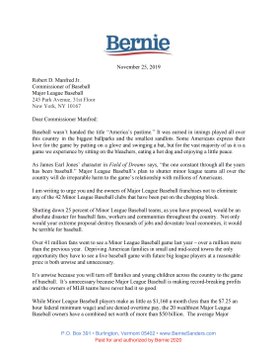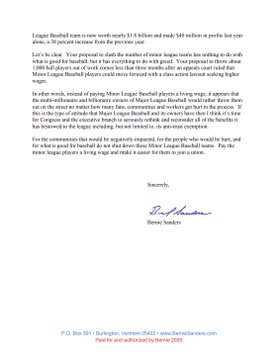/cdn.vox-cdn.com/uploads/chorus_image/image/65976579/Credit_Jeff_Hook_Sacramento_Skyline_2019___2.7.jpg)
In Erie, Pennsylvania, local leaders are once again rallying for minor league baseball. This time, the home of the SeaWolves isn’t trying to land a team, like it did in 1989, but instead wants to keep its team in the face of a plan that might see 42 minor league teams across the country lose their affiliation with Major League Baseball (MLB).
The anxiety being felt in Erie and other cities and small towns across the country stems from a recent proposal by pro baseball’s leadership to cut teams and consolidate the minor leagues. The minor league system, which contains 160 affiliated teams in 14 different leagues spread across the U.S. and Canada, functions as a farm system where talent is developed for the big leagues. With the current agreement between the leagues set to expire after 2020, MLB executives are looking to cut costs, jettison underperforming teams, and raise the quality of minor league play. Losing affiliation with the majors would mean losing support, funding (especially for player salary, a team’s biggest expense), the equity value of a franchise, and could spell financial ruin for small ball clubs.
The proposal to cut teams has led to significant blowback across the nation. Erie Mayor Joe Schember, whose parents pushed to help build the current downtown ballpark, has reached out to regional and government officials to try and convince the league that it would be a mistake to drop teams like the SeaWolves (especially since the team just invested $16 million in upgrading their ballpark). More than 100 members of the House of Representatives signed a letter asking MLB to reconsider, and key senators have pushed back against the plan, especially Bernie Sanders, who wrote a letter to MLB Commissioner Rob Manfred suggesting the league’s exemption from antitrust laws could be at stake.
“Shutting down 25 percent of Minor League Baseball teams, as you have proposed, would be an absolute disaster for baseball fans, workers and communities throughout the country,” wrote Senator Sanders, who once helped bring a team to Burlington, Vermont, when he was mayor. “Not only would your extreme proposal destroy thousands of jobs and devastate local economies, it would be terrible for baseball.”
“If you build it, they will come.”
Cutting back on Minor League baseball strikes at romantic notions of the sport as a national pastime. In addition to nostalgic ideas of baseball bringing communities together, it’s considered an economic development engine for small towns; when minor league teams lose major league support or shutter altogether, it can have a negative economic impact, including the loss of hundreds or even thousands of jobs nationwide and the closure of stadiums that might anchor downtowns.
“Our goal is to keep baseball in the 160 minor league markets that we currently have. We want to do what we can to continue to grow baseball,” said Jeff Lantz, senior director of communications for Minor League Baseball, to SB Nation. “A lot of kids might be losing baseball. The real negative here is the future of the game has been put in jeopardy a little bit.”
The controversy over MLB’s proposal also epitomizes the debate that surrounds economic development and inequality in small town U.S.A. The plan could potentially mean markets that aren’t close to major cities lose access to professional baseball. It also raises questions about whether sports should be an anchor for development.
The Binghamton, New York Rumble Ponies released a statement saying “No one is stealing hometown American baseball from The Bing, or any other city in America, without a fight.”
Minor league teams as downtown catalysts
The 42 teams slated for potential elimination vary widely in size and location. Teams in the Appalachian League, for instance, often draw just a few hundred fans per game to small town ballparks. Other teams, such as the Daytona, Florida, Tortugas, have stadiums in the center of small cities that anchor downtown developments.
Tortugas owner Rick French says that “there’s a lot of economic development taking place near the stadium,” and that they employ more than 100 people every game night.
Regardless of size, most of these teams are the only professional sports team where they play. There’s a lot of civic pride wrapped into having, and then losing, a team, especially in towns that have already lost major employers or other big institutions.
But while there’s plenty of nostalgia, and the selling point of creating a nexus for economic development downtown, a big part of the development story of minor league baseball, especially for larger teams, includes public subsidies and tax breaks, which haven’t always paid off. Many cities and towns have spent millions to lure teams, only to see dwindling attendance and difficulty repaying the public investment in new stadiums. A trio of stadium projects in New Jersey built in the late ‘90s for fledgling minor league teams have all either been torn down or lie empty, with the bonds to finance their construction still being paid off.
“A major league stadium generates roughly the same number of year round, full-time jobs as a large Macy’s department store,” Victor Matheson, economist and professor at College of the Holy Cross, told USA Today. “Minor league is going to generate maybe a tenth of that number. Most jobs being generated at the minor league level are very low level, part-time, minimum wage jobs.”
What happens next?
The agreement between the MLB and the minor leagues expires at the end of the 2020 season, so both sides expect negotiations to continue for the next few months. The MLB’s plan for the newly unaffiliated teams—the so-called Dream League, which would stretch across much of the country—has been called a non-starter by minor league officials, who say the lack of MLB support and the increased travel costs make the idea untenable.
As Senator Sanders says, it’s an emotional issue, and baseball shouldn’t be a “bottom-line business.” But the tale of minor league reorganization also highlights how hard small cities and towns work to find any economic catalyst, even one that can be rich in symbolism, but not always results. There ultimately needs to be more than one game in town.



No comments:
Post a Comment